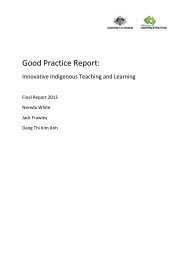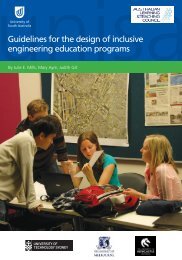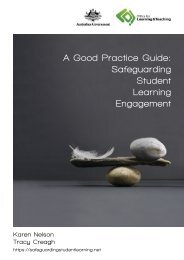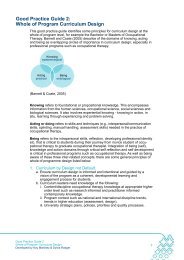(14) Do you like presentations? Why / why not?Five of them liked presentations. One of them commented, “I do likepresentations…. At first, when you do presentations, it helps you to practice <strong>and</strong>improve your ability of talking in public. … Once you complete your presentation <strong>and</strong>you get good results, you will feel successful <strong>and</strong> happy, well worth the ef<strong>for</strong>t”. Onegraduate thought it was important but he just did not like it; he commented, “When Iwas a student, I did not like presentations. However, I feel the presentation is a goodexercise …because presentation could occur anywhere you worked. For example,in my company you need to present what you did during the week every Friday”.Another graduate said she did not like presentations because she was too shy. Shecommented, “No, I’m too shy. In Japan, I didn’t really have open presentations. Mypersonality isn’t suited to public speaking. It’s hard to do in front of many people”.(15) What are the main problems with presentation?It was overall agreed that the two main problems faced by international studentswere language problems <strong>and</strong> personality difficulties. Five graduates mentioned thatlanguage was the problem. Shyness <strong>and</strong> feeling nervous be<strong>for</strong>e the public wasanother main problem. One commented, “Probably my personality, I just don’t liketalking in front of many people, I feel my English <strong>and</strong> accent isn’t good enough, I’mnot confident enough. … It’s worse when local students give theirs, <strong>and</strong> then youhave to follow with your own presentation!” Some graduates also mention problemsof technique, such as using PowerPoint <strong>and</strong> time management. However, one ofthem commented, “Shyness is not a huge problem; the only thing is knowing how topresent your material, making it clear … Time is also important, fitting your points<strong>and</strong> ideas into an acceptable time window”.(16) Do you like to work with international students as a group? Why / why not?There were four groups of opinions. The first group liked to work with internationalstudents. One of them commented, “Yes, I like to work with international students asa group…. when you work in groups with international students, you can tradeinteresting ideas from the students who are from the different countries <strong>and</strong>cultures”. The second group contains three students who did not care about this.One of them commented, “It doesn’t really matter to me. I will use English as muchas possible <strong>and</strong> different people have different study methods”. The third groupthought it depends on the situation. One of them said, “It depends on the situation. Ifit is a discussion, I prefer local students,… I don’t like to choose other Asianinternational students… I find it hard to underst<strong>and</strong> some accents”. The fourth groupliked to work with local students. One of them commented, “For me I like localstudents because they can help to improve my English”.(17) Do you think your group will achieve better or worse results if some or most ofthe members are international students?There are two main groups of ideas. The first group believed that working withinternational members could achieve better results. One of them commented, “Lotsof international students obtain good grades <strong>for</strong> their assignments. …When I workedwith the group members who were from Japan, Hong Kong, Singapore <strong>and</strong> Taiwan,they were hard workers <strong>and</strong> their study attitude was earnest. … <strong>and</strong> found I couldget better marks”. The second group was concerned that the ratio of internationalstudents in the group would affect results. One of them commented, “Everything hasa balance. For example, if you are the only international student <strong>and</strong> all others arelocals, the results won’t be like if the group was half international <strong>and</strong> half local. Inmy experience, half <strong>and</strong> half get a good result. Same as when the group is mostlyinternational, with a local student. I don’t think it is a good result”.5.4.3 Education Management Systems(1) Did you have difficulties in selecting subjects, majors, minor or electives whenyou first started your university study in Australia?93
Only two of the graduates had difficulties in selecting subjects, majors or electiveswhen they first started their university study in Australia. One of them commented, “Iguess, yeah I had difficulties. I think that is the reason I studied the bachelor ofManagement <strong>and</strong> Professional studies. I could choose from a wide range of units tosuit my interests, from Business, Law, Cultural Studies, <strong>and</strong> even Arts studies”. Theother graduates did not have problems because some of them didn’t need to select<strong>and</strong> others obtained help from universities or their friends. One of them commented,“No, I did not get any problems … The university provided the materials <strong>for</strong> selectingmajors, minors or electives <strong>and</strong> it was very helpful”.(2) Are you happy with the way the credit point system works?Five of them thought that the credit point system was good. The remainder did notcare or had not encountered problems. For example, one of them commented, “Itdoes not matter to me. However, I prefer the system where you have the samecredit points in every unit”.(3) Are you familiar with your university’s preferred referencing system?Most of them had no problems with the preferred referencing system. One of themcommented, “Yes, I am familiar with my university’s preferred referencing system. Ifelt I got lots of help <strong>and</strong> training in our university. For example, Rosemary alwaysgave me good guidance <strong>for</strong> how to write the reference”. But one graduate said hehad difficulties at first, commenting, “In the beginning I found it difficult <strong>for</strong> me. I wentto see Rosemary a lot of times to help me use the referencing system, <strong>and</strong>everything. After consulting her, I found it quite easy to do …” Only one studentanswered no to this question.(4) Where do you normally do your study? Why?There were three groups of responses. The first group liked to study at the library.One of them said, “In general, I study in the library because it is a good environment<strong>and</strong> has a great study atmosphere there. The library makes it easier to locate <strong>and</strong>study materials, <strong>and</strong> you can borrow books. It is also easier to meet fellow studentswho study the class with you”. The second group liked to study at home. Onecomment was, “Generally, at home. I prefer at home because I feel relaxed, I canstudy on the ground, or chair, or table, <strong>and</strong> I can study <strong>and</strong> eat at the same time!”The third group would sometimes go to university <strong>and</strong> sometimes stay at home. Onecomment was, “When I write an essay or report, I like to study in the computer labs,<strong>and</strong> in the library where there’s more reference material”.(5) Do you spend much time studying on campus? Why/ why not?All of the graduates spent much time studying on campus. Some of them felt moreefficient if they studied on campus. One of the comments was, “I spend a lot of timereading <strong>and</strong> studying at campus, when I go home I can relax <strong>and</strong> eat”.5.4.4 Language(1) Would you say that language is the main problem when you started your study inAustralia?Seven out of the nine graduates felt that language was a big problem. One of themcommented, “Yes! In the beginning it was obviously difficult. The accent is verydifferent to my own so listening <strong>and</strong> communicating wasn’t too easy. … so noweverything is ok <strong>for</strong> me”. Two of them still think language is a problem but no longerthe major one. One of them said her biggest problem was culture shock as well asfeeling lonely, <strong>and</strong> missing her family.(2) What is the main issue with English? Reading? / Underst<strong>and</strong>ing? / Writing?All the graduates had different problems in English. Some of them believed theirinsufficient skills in listening <strong>and</strong> speaking skills resulted in them not being able tounderst<strong>and</strong> lectures. For example, one of them commented, “Be<strong>for</strong>e I come to94
- Page 1 and 2:
Strategies and Approaches toTeachin
- Page 3 and 4:
Table of Contents0 EXECUTIVE SUMMAR
- Page 5:
0 Executive SummaryAustralian terti
- Page 8 and 9:
1 Project OutcomesThe outcomes of t
- Page 10 and 11:
The identification information sect
- Page 12:
questions aim to discover their ass
- Page 15 and 16:
3.2 Literature reviewCross-cultural
- Page 17 and 18:
4 Survey Data AnalysisThis section
- Page 19 and 20:
Total Count 380 632 1012Percentage
- Page 21 and 22:
2 Count 12 30 42Percentage 3.1% 4.7
- Page 23 and 24:
Table 13 shows that nearly all loca
- Page 25 and 26:
methods are good, while less than h
- Page 27 and 28:
Preferredfewerlectures andmore labs
- Page 29 and 30:
Table 26 (Question III.4.D) Preferr
- Page 31 and 32:
Maindifferencesbetweenteachingmetho
- Page 33 and 34:
Table 33 shows that about half of l
- Page 35 and 36:
Table 38 (Question IV.4) Sufficient
- Page 37 and 38:
understanding lectures?Table 42 (Qu
- Page 39 and 40:
confident Count 301 179 480Percenta
- Page 41 and 42:
Table 49 (Question VI.4) Caring abo
- Page 43 and 44: Table 52 shows that more local stud
- Page 45 and 46: Table 56 shows that both local and
- Page 47 and 48: a chi-square test to determine whet
- Page 49 and 50: Significance Level (α= 0.05)Hypoth
- Page 51 and 52: presentations are unrelated (Indepe
- Page 53 and 54: Hypotheses V.2H0: Student category
- Page 55 and 56: encountered at university in 2/3/4
- Page 57 and 58: III.7What are you most concerned ab
- Page 59 and 60: II.6.EII.6.FII.6.GTextbooks you pre
- Page 61 and 62: VII. OtherVII.1.1VII.1.2What are th
- Page 63 and 64: III.6 Do you like lecturers to ask
- Page 65 and 66: distribution of these comments acro
- Page 67 and 68: Figure 4.5 University of Sydney und
- Page 69 and 70: Australia is the environment (11.06
- Page 71 and 72: example, one student said that home
- Page 73 and 74: 5 Interview Data AnalysisThis secti
- Page 75 and 76: class?Eight students thought studen
- Page 77 and 78: (1) Did you have any difficulty sel
- Page 79 and 80: 5.2 Staff interview data analysisA
- Page 81 and 82: (2) Do you think that the methods y
- Page 83 and 84: is the biggest problem”. One lect
- Page 85 and 86: comments was, “No, I send them to
- Page 87 and 88: lecturer, and one of them like the
- Page 89 and 90: am a shy person I am not comfortabl
- Page 91 and 92: When they have difficulties in read
- Page 93: (7) Have you been involved in many
- Page 97 and 98: Furthermore, I was not familiar wit
- Page 99 and 100: ased communication style such as e-
- Page 101 and 102: CrosstabDifficultieswhenreadingtext
- Page 103 and 104: CrosstabPreferred workingin groups
- Page 105 and 106: CrosstabMain differencesbetween tea
- Page 107 and 108: CrosstabWhat are the maindifficulti
- Page 109 and 110: CrosstabDo you have anyEnglish lang
- Page 111 and 112: CrosstabDo you have anyEnglish lang
- Page 113 and 114: CrosstabAre you confidentabout your
- Page 115 and 116: CrosstabDo you have anyEnglish lang
- Page 117 and 118: CrosstabWhat are the mainstudy diff
- Page 119 and 120: Pearson Chi-SquareLikelihood RatioN
- Page 121 and 122: ead lecture notes.2. Regarding the
- Page 123 and 124: II.9 0.022 0.097 0.174 0.02 0.135II
- Page 125 and 126: From Table 65, we can see that ther
- Page 127 and 128: countries peoples. Personally, I fi
- Page 129 and 130: perceived by them as something insi
- Page 131 and 132: 7. Arrange peer groups for those st
- Page 133 and 134: covered (or not covered well) in th
- Page 135 and 136: 13. Ask assistance from internation
- Page 137 and 138: 11) • Weekly groupcase studies an
- Page 139 and 140: 8 Guideline for International Stude
- Page 141 and 142: life. However, it is very important
- Page 143 and 144: There are ways of maintaining focus
- Page 145 and 146:
Expect to be nervous initially and
- Page 147 and 148:
Avoid cheating and plagiarismAustra
- Page 149 and 150:
9 Disciplinary and interdisciplinar
- Page 151 and 152:
10 Results communication, publicati
- Page 153 and 154:
Visiting Professor Javier Montero f
- Page 155 and 156:
11 ReferencesAsmar C. (1999), Schol
















